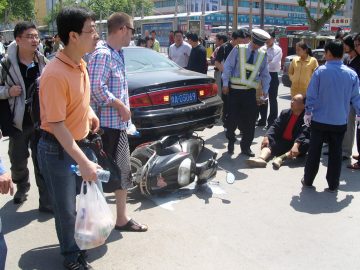
Although many members of our community don’t drive themselves, nearly all of us spend a good amount of time being driven—whether by Didi drivers, bus drivers, cab drivers, family members, or family drivers. What are the risks and rewards of transportation in Guangzhou? How safe is it to use the roads in China at large?
A common perception of Chinese drivers is that they routinely ignore traffic laws. Drivers in China seem to have become accustomed to relying their own type of “driving sixth sense,” a sort of survival instinct. In comparing the driving rules of the U.S. to those in China, the difference is notable. Drivers in China have a greater tendency to create their own driving rules, which changes what is expected when taking a taxi or a bus anywhere. More than 700 people are killed in road accidents in China daily, in stark contrast to the 102 people are killed daily in America (of course, the population of China is 4.2 times larger than that of the U.S., meaning that roughly 1.6 times as many people are killed on the Chinese roads than in U.S. traffic accidents).
“Driving in China is especially dangerous because a lot of the drivers don’t necessarily know what they’re doing,” said Sophia L, “especially bus drivers, they are adapted to drive cars and drive buses the same way, so there is a big problem with understanding the vehicle, they don’t have complete control. I also think the bikes and lanes are an issue. Bikers often go the opposite way in the wrong lane and ignore crosswalks.”
Driving in some countries is one of the many rites of passage for teenagers, but this is compromised when you grow up in an environment where driving is less safe. Personally, I would not consider China to be the ideal place to learn about driving rules and regulations, as they are not followed as much as they should be.
With insight from living in many different countries, Mr. Kennett shared his perspective on the issue: “I’ve never driven anywhere I’ve lived, I’ve only had a driver because the traffic, especially in South Korea, was too terrible to drive. Overall the driving here is a bit better than where I was in Egypt. The quality of the roads is better even though the traffic is a bit heavy. I wish people would use their indicator more, though. I think learning to drive successfully here would be helpful to developing defensive techniques, but also could mean you get into the habit of not staying in your own lane, because no else does.”
Using cellphones while driving is another prominent issue with driving in China. Drivers—especially, in my opinion, cab drivers—have been noted to spend a lot of time on their phones. Whether they are texting or watching a movie, their choices can definitely lead to unsafe feelings, especially if the passenger does not have sufficient Chinese to ask them to stop.
On the bright side, Guangzhou has very efficient system of public transportation. Taking a taxi, bus, or Didi is relatively cheap compared to almost anywhere else in the world. Also, the illegalization of electric bikes (e-bikes) and other motorbikes on the roads in 2006 and 2016 caused a improvement in the safety of Guangzhou’s roads.
Before this ban, e-bikes were treated like bicycles, and did not require a license to drive. They were also very cheap to purchase. Often, a driver could fit an entire family on one bike, leaving limbs dangling precariously for other drivers to avoid. The issue was, in large cities, the massive number of e-bikes became problematic: e-bikes were involved in many accidents due to improper use. The China transportation organization statistics showed that 31,404 accidents in Beijing involved e-bikes. 113 of these accidents were fatal and over 21,000 resulted in injuries. Statistics also showed that with 4 million e-bikes in China, 37% of all traffic accident injuries were e-bike related. This factor, added to the fact that the government wanted to encourage more people to use public transit, resulted in the ban of e-bikes.
E-bikes were initially used as a replacement for the environmentally hazardous motorcycles. The emissions from the motorcycles are responsible for nearly 2/3 of the air pollution in Beijing. However, even with the e-bike contributing to a drop in pollution levels, the amount of lead, a less known pollutant, in the batteries is also extremely hazardous to the environment.
Based on these statistics, it can be argued that policies such as the e-bike ban have made Guangzhou safer in comparison to other cities in China. Also, it might be true that driving in China is safer in comparison to other countries, where next to no driving laws are consistently enforced.
For more information about the ban on e-bikes, go to Pacific Prime China.